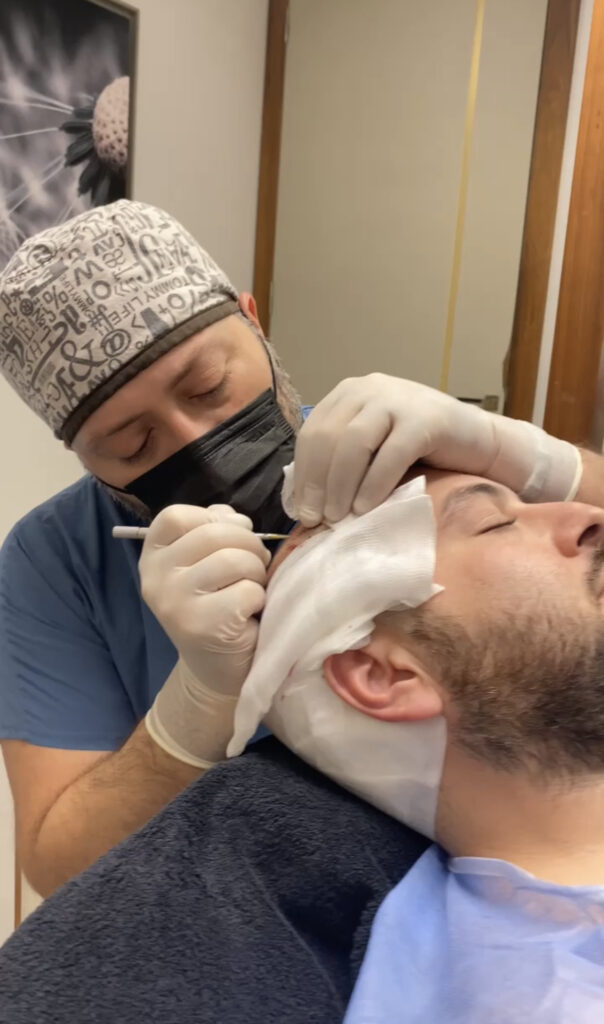You might already be picturing what it would be like to see your hairline back where it used to be if you’re thinking about getting hair implants. You might have watched a friend go through it. You might just be bored of disguising your hair loss with caps or particular haircuts.
We realize you’re not here to hear a sales pitch, no matter what brought you here. You want solid knowledge on what works, what is feasible, and what you should think about before you move ahead.
So let’s go over the pros and disadvantages of hair implants. This isn’t merely a shift in looks. It can change how you feel, how you act, and how you move through life. That’s something to think about.

What are hair implants?
Hair implants are a means to get your hair back by moving healthy follicles from the back or sides of your head to places where hair is thinning or gone completely. We can do this with accuracy, comfort, and outcomes that seem natural thanks to methods including FUE, DHI, Sapphire FUE, and Implanter Plus. Implants are permanent, unlike temporary remedies like wigs or powders. When the transplanted hair takes root, it grows just like your other hair.
The Good Things About Hair Implants
1. Growth that lasts and seems natural
The best thing about this is that it’s not a quick fix; it’s a long-term solution. The follicles that were transplanted are your own, so the results look natural. No special skills for styling. No daily cleaning schedules.
2. Comfort and Confidence
People lose hair in different ways, but for a lot of them, it hurts their self-esteem. Getting your hair back generally means getting your confidence back as well. We’ve seen it in our patients: they stand up straighter, smile more easily, and stop hiding behind hats or angles.
3. Made only for you
There isn’t a strategy to copy and paste. Your hair type, facial structure, and long-term goals all play a role in how each transplant is planned. You are the only one who can decide how to fix your hairline, fill in your temples, or make thinning areas thicker.
4. Not much work to do when you’re better
You take care of the hair like you do the rest of your hair once it has healed and started to grow. You can wash it, trim it, and style it without having to worry about anything fake.
5. Accuracy in Technology
We can put hairs at the proper angle and density to mirror your natural growth with methods like DHI and Sapphire FUE. It’s not just about getting your hair back; it’s also about making sure no one can identify where the old hair ends and the new hair starts.
Things to Think About Before Moving Forward
1. It’s not a quick fix; it’s a process
Yes, the surgery just takes a day, but it takes time to see the full benefits. Most patients start to observe real growth after three months, and the last results show up between nine and twelve months.
2. Not everyone Is a good fit
You need a donor area that is healthy and realistic expectations. We are always honest during consultations. If we don’t think a transplant is right for you, we’ll tell you why and speak about other possibilities.
3. The price shows the quality
A good hair implant treatment costs a lot of money. And it shouldn’t be. This is how you look, your skin, and your confidence. It’s important to pick a clinic that is open, medically sound, and focused on long-term results instead of quick turnover.
4. Recovery is important
The healing isn’t painful, but you do need to take care of it. You’ll need to follow specific instructions, avoid certain activities for a short period, and be patient as the healing happens. The good news is that we will help you with anything and are always accessible to answer your inquiries.
5. It’s up to you to decide
There is no right or wrong reason to desire your hair back. It could be because you want to feel young, or it could be because you want to feel good about yourself. Or maybe it’s just something you’ve always wanted to do. No matter what the rationale is, it should feel like your choice, not what someone else thinks you “should” do.


